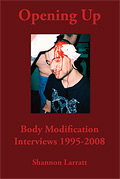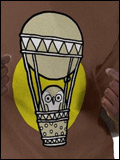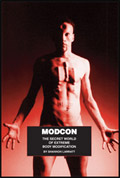I just did a little interview mostly on stereotypes; I'm posting it here for archival purposes… I'll tell you, the prevalence and attention to every “pointless” detail that's resulted from the blog phenomena is going to make it easy for the senior citizens of the future to write their memoirs… assuming the robots don't do it for us, after exterminating the lot of us. Anyway, it's a little repetative of things I've said in past interviews, but I guess that's to be expected.
| Tell me a little about your modification history and how you started BME.
I first started to feel the “drive” to change myself probably around puberty (I believe that modification urges, at least for people where “it’s not a choice”, are sexual in nature). At the time I was living in rural Canada, and while my father was tattooed, I certainly wasn’t exposed to it other than through books — you know, the old National Geographic story, which is very common to modified people who are about my age. At that time tattoo studios and piercing studios didn’t exist on any large scale yet. Anyway, I started by doing piercings on myself that were hidden, just with stuff I could find or make. I think my first “public” changes were piercing my ears — back then it was strange for a guy to have both ears pierced, so I got the occasional hick calling me “ma’am” (I had long hair as well), but it didn’t really bother me. Not long afterward I started stretching my ears as well, doing branding, and tattooing myself using both hand-poking and machines of my own design. By the early 1990s I was living in Toronto and piercing studios were just starting to open. I was very lucky to walk into Stainless Studios, got a job almost immediately making jewelry, and it just sort of exploded from there. That studio was a very dynamic environment where a lot of development work went on. I think if I hadn’t had the dumb luck of meeting and befriending Tom Brazda (and later Jon Cobb as well) things would have turned out very differently — both of them are two of the core influences not just in my life but in modern piercing internationally. At about the same time the Internet was taking off. I’d gotten online primarily to take part in USENET’s rec.arts.bodyart and in late 1994 fired up a personal website. At first it was just photos of myself and articles about my experiences, as well as some pictures from Tom’s portfolio, but I included a note along the lines of “if you’d like me to post your pictures or stories, send them to me”… and then it snowballed and the rest is history. How do you think the media portrays modified people? The media portrays modified people in the same way that they portray everyone — in whatever way they feel will get them the most viewers and keep them watching through the commercials. Advertising dollars are the beginning and end of what drives television programming, and thus TV tends to be a reflection of whatever the current mob mentality is. It’s going through a cycle of presenting it as totally sick, then “cool freak chic”, then passé. I’d say we’re in that mainstream phase somewhere between the last two these days, although there are some particularly small minded personalities that will never leave the “totally sick” stage no matter what. What do you think is the most common stereotype of modified people in the media? That modified people are criminals, degenerates, losers, and otherwise unable to amount to anything. I’m somewhat surprised that one has even lasted it’s so false. It’s not as if it’s 1894 and we’re all a bunch of sailors or something. What’s the most absurd stereotype of modified people that you’ve witnessed? On the whole I think it’s absurd to present any stereotype of modified people. Body modification hits an incredibly broad demographic. It’s like saying “what’s the most absurd stereotype of Americans you’ve witnessed” (ever seen Killing Zoe? — “I’m an American! American! I’m just here exchanging dollars. If it wasn’t for my country you’d all be speaking German!”)… it’s simply not fair to present any stereotype in a demographic group that covers so many different types of people. Do you think there should be an effort by modified people to change these negative stereotypes? Only through our actions. Ranting about it doesn’t get you anywhere, because it doesn’t offer any proof. Be modified and be successful (however you define that). Why do you think these stereotypes have developed? Some stereotypes exist because there is a statistical truth to them — “Kenyans can run faster than Inuit” would be good example. I don’t really have a problem with those, as long as people understand that the stereotype only applies to the group but not the individual. The stereotypes you’re asking me about here though are different because they’re based on misconceptions and shallow understanding. Their source is many people not being able to empathize with anything past the end of their nose. How is BME working to end these stereotypes? While BME is a pretty cutting edge and “far out” publication that straddles what’s even legal to document in nearly every nation in this world, I’ve worked very hard — as have many, many people who feel similarly — to present this material responsibly and with insight that helps people with an open mind understand what we’re all about, and that our drives to do the things we do are every bit as valid and positive as the things that drive them. Anything else you want to say regarding stereotypes of modified people? Statistically inaccurate stereotypes reflect far worse on the people who hold those stereotypes than on the people who are being stereotyped. I consider them an idiot detector. |



Post a Comment